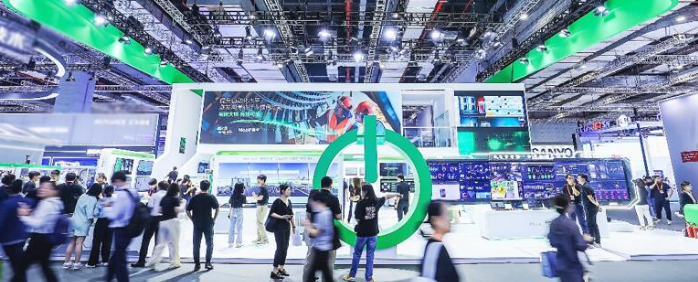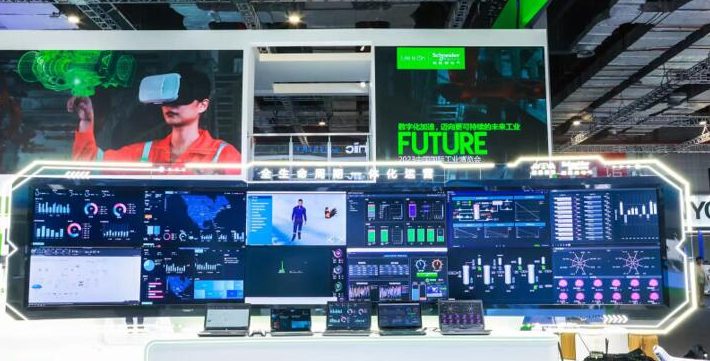Industry is an important pillar of human civilization and an important driving force for economic and social development. With the advancement of science and technology and changes in the market, the industrial field is facing unprecedented opportunities and challenges. On the one hand, new technologies such as digitalization, intelligence, and networking are constantly emerging, providing new possibilities and development potential for the industrial industry. On the other hand, global issues such as climate change, energy crisis, and environmental pollution have become increasingly prominent, placing new demands and responsibilities on industrial enterprises.
In this context, how to achieve high-quality and sustainable industrial development has become the focus of attention of industrial enterprises and all sectors of society.
As a global digital transformation expert in the field of energy management and automation, Schneider Electric is committed to empowering various industries to maximize the use of energy and resources and promote human progress and sustainable development. Based on its profound digital technology accumulation and rich industry practical experience, as well as its open and win-win cooperation concept, Schneider Electric will appear at the 2023 China International Industry Expo ("Industrial Industry") with the theme of "Digital Acceleration, Toward a More Sustainable Future Industry" Expo"), innovatively proposed the concept of "future industry", emphasizing the four characteristics of openness, efficiency and resilience, sustainability, and people-oriented.
According to Pang Xingjian, senior vice president of Schneider Electric and head of the industrial automation business in China, the future industry is not only a technological change, but also a change in thinking. It is a transformation of the industrial value chain, ecosystem, business model, and social responsibility. Comprehensive reshaping of aspects.
What is future industry?
As the digitalization process in the industrial field accelerates, underlying technologies such as artificial intelligence and the industrial Internet are comprehensively reshaping the industrial production system and promoting the establishment of new production factors, R&D paradigms and business models.

Shen Hongfeng, Director of Strategy and Business Development of Schneider Electric Industrial Automation China, said that from the concept of green intelligent manufacturing to today's future industrial vision, it demonstrates Schneider Electric's latest insights and thinking on the changes of the times and customer needs. Shen Hongfeng used several keywords to explain the four major characteristics of future industry: openness, efficiency and resilience, sustainability, and people-oriented.
Shen Hongfeng believes that if an enterprise wants to develop, it must first embrace an open system with an open mind, keep pace with the times, and actively integrate with the outside world to achieve progress and development. How companies improve efficiency and ensure resilience when facing challenges and market uncertainty is related to their own survival. Shen Hongfeng added that it is unsustainable to achieve development at the expense of the environment and resources. To achieve sustainable industrial development, industrial software, automation systems and energy management are indispensable. Focusing on people-oriented, he believes that enterprises should empower people with technology, so that people can get rid of repetitive operations and engage in safer, more efficient and more valuable work, establish a more dynamic and forward-looking operating model, and make it easier and more efficient. Achieve business goals with greater value.
In addition, the new supply chain supported by green and digitalization is also an indispensable link for enterprises to lead to the future industry. As a leader in first-class supply chain construction and a forerunner in supply chain management, Schneider Electric also actively assumes the role of enabler, in-depth understanding of the pain points and challenges faced by supply chain transformation, providing enterprises with supply chain consulting solutions, and helping enterprises cope with transformation challenges. , to build a first-class supply chain for future industries.
Promoting future industry with open automation
Openness is one of the important features of future industry. In the digital era, openness means more collaboration, innovation and win-win; in the field of automation, openness means more interoperability, portability and standardization.
Traditional automation systems are often closed, proprietary, and incompatible, which brings many problems to enterprises, such as difficulty in upgrading, high maintenance costs, and many data islands. Schneider Electric spares no effort to advocate open automation, which is to break down these barriers and enable seamless connection and data flow between different manufacturers, different equipment, and different platforms, so that enterprises can flexibly choose solutions that better suit their needs to achieve better results. Best production operations.
In order to promote the development of open automation, Schneider Electric created the EcoStruxure open automation platform based on the international standard IEC 61499. At this year's CIIF, Schneider Electric brought the latest EcoStruxure open automation platform V23.0. The new platform after iteration integrates discrete, hybrid and process industry operations, is deeply integrated with the AVEVA system platform, is compatible with Windows and Linux operating systems, and is equipped with high-availability control for industries and application scenarios that require high availability. Through a unified platform and unified Asset data from various sources helps different industrial fields achieve full-process digital continuity from design to operation and maintenance.
Pang Xingjian revealed that Schneider Electric's EcoStruxure open automation platform has made very good progress in China's business and achieved rapid growth, and its business share is currently the highest in the world. Schneider Electric is constantly exploring the open automation platform Combined with edge computing, edge management, 5G technology, etc., it improves the integration capabilities of IT and OT.
Digitalization and sustainability accelerate enterprises towards the future industry
Pang Xingjian believes that digitalization and sustainability are topics that require long-term attention for future enterprise development. For industrial enterprises, digital acceleration and sustainable development are two long-term strategies that are inseparable and mutually reinforcing. Digitalization provides the foundation for sustainable development, and sustainable development provides a new stage and development impetus for digitalization. Schneider Electric is using its comprehensive digital acceleration capabilities and experience to help companies move towards a more sustainable future industry.
At the CIIE, Schneider Electric demonstrated its digital and sustainable solutions in all types of discrete, process and hybrid industrial scenarios, such as industrial digital twins built with software such as AVEVA, Cobot collaborative robots, and new generation Lexium 18 series servo , new generation TeSys Giga remote intelligent diagnosis module, software and hardware solutions for edge computing scenarios, EcoStruxure microgrid energy consultant and full life cycle services, etc.
At the same time, based on the successful application of the integration of 5G communication technology and industrial scenarios, Schneider Electric also joined hands with the Academy of Information and Communications Technology and China Unicom to jointly publish the "5G+PLC Deep Integration Solution" white paper to explore through practice the benefits brought by the connection between 5G and the control layer. value, with the rapid popularization of new technologies to help enterprises accelerate their move towards the future industry.
